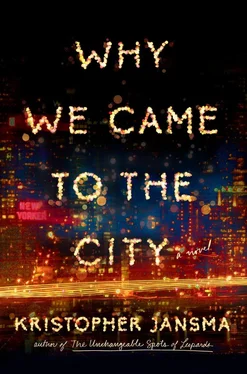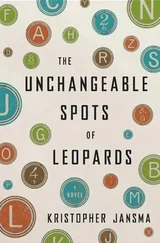On the day Ella finally came up to Ward III, Jacob was all set. Barely acknowledging her presence in the group sessions or the art room, each morning he would find his way over to the closet library and slip one poem into the middle of whichever book he’d seen her reading the day before. Then in the afternoon, when she went over to reclaim her book, he’d watch from the windowsill as she found the poem tucked inside. Anne Sexton one day, Keats the next. He tried to avoid any chronology. “Is there a W theme?” she wrote on the inside cover of one book after the first few days, when she’d gotten William Carlos Williams, Wislawa Szymborska, and Wallace Stevens. The next day she got Wang Wei and a note that said, “Theme = Poems That Do Not Suck.”
At first he’d been wary of writing on the poems, because anyone who found one lying around her room was bound to get the wrong idea. But then he realized it wasn’t like anyone would recognize his handwriting, except maybe Oliver, and what was he going to do about it? Anyone else would just assume it was a by-product of some interpatient romance (which were just about always going on). Teenagers were teenagers, especially crazy ones.
After one week, Ella wrote a poem back. He found it folded up under the edge of the chessboard during Dr. Feingold’s group. While the patients went around discussing their relationships with their parents in advance of that afternoon’s visitation, Jacob quietly unfolded the neatly hand-printed page. “The Whole Ball of Wax” described a ten-year-old girl who eats every crayon in a box of sixty-four, vividly imagining the flavors of Brick Red (“too salty by a mile”) and Caribbean Green (“like pea soup turned up the dial”) and “Outer Space” which “vanishes between my teeth / refusing to exist in me.” After the final crayon, a Yellow Orange, sets her “intestines roiling” (not bad, for a rhyme with orange), the girl eases her own belly button open with two fingers and extracts the titular ball of wax—“a lump / indigestible and indefensible. / A Crayola cortex / slick with slime / my parents shriek / and jam it down the disposal / with two ounces of vegetable oil. // They hit the switch. / Colors fly into the air / settling like snowflakes / in their shirt collars / and hair.”
He could feel her eyes on him, searching for approval. Without supplying any visual cues, he took his pen and began circling weaker words, underlining a few tremendously good ones. There needed to be another syllable here, one removed there. Rhymes weren’t really in vogue anymore, but they were tolerable until you turned into Dr. Seuss. He noted this in the margin and slipped the poem back beside the chessboard and listened to the group’s discussion again.
“My parents are both so in love with themselves, it’s disgusting,” Anne Marie was saying. “When they look at me, they’re just seeing themselves, and if I’m not doing a good job with their half, they get pissed.”
“Mine are divorced,” John agreed. “So they each just see the shit they can’t stand about the other.”
Dr. Feingold nodded. “There is a mirror effect there, yes, but it goes two ways. Parents see their own faults in us. We see our own fears in them.”
Jacob didn’t think this was particularly true, as a rule, at least not in his case.
A prim girl, Karen, announced, “My parents think the president was born in Kenya.”
Dr. Feingold was trying hard not to smile as she continued.
“Last Christmas my dad bought everyone in the family guns. Mine and my brother’s they’re going to keep in the attic until we’re older, but he said he can’t wait until because by then the government will have outlawed the Second Commandment.”
Jacob listened as the group described mothers who lived at Bed Bath & Beyond, racking up credit card bills with purchases of window treatments, pod coffeemakers, and slow cookers that were never even unboxed. Fathers who drank a six-pack a night while watching Three Stooges reruns. Some loved too much, others not enough. They had stuck them in here, though no one gave any sign they were happy to be away from these alleged monsters, who embarrassed them in public, didn’t understand, had no idea what it was like to be a kid these days. They were overbearing, underbearing, and bared too much skin at summer swim parties. They slept with teachers, secretaries, neighbors, or the parents of friends, or else they desperately needed to get laid. They had gotten divorced too fast or had stayed together too long. They had married too young or too late. They had irresponsible numbers of children, or they had focused all their energy and attention on just one. They were untrusting, unsupportive, manic, drunk, cheap, anal, bullying, balding, varicose veined, miserable, fucked-up, saggy-armed, Botoxed. The list was endless.
Jacob waited to hear what Ella would say, if anything. What had happened to make her this way? Why did she need to be kept safe here, like him? Had her parents raised her in some kind of protective bubble? Was she, like some zoo-born animal, incapable of reentering the jungle? He heard the other kids talking about their big plans. All eager to get out and join some startup. Or marketing their own lines of purses or building an Etsy empire. But Ella never seemed interested.
“Ella. You’ve been very quiet,” Dr. Feingold pressed.
“My parents are—” She took her glasses off as if to clean them, then set them back. Jacob realized he had both feet wrapped around the legs of his chair.
“My parents are such… stupid—” Ella began.
Dr. Feingold gestured for her to continue.
“Such stupidly happy people.”
Jacob spotted them later at the family visitation, held biweekly in the sanctuary of the former chapel. The stained-glass windows here were the last real building features that remained from the convent days, deemed too beautiful to be torn out, even if they did depict horn-tooting angels and sword-wielding saints. Jacob couldn’t actually get close enough to hear how the visit was going, but he watched: mother just like Ella but with hair up in a twist, chin doubled, and cheeks red with capillaries; father pudgy with a street-sweeper mustache, spiffy spectacles, and a Livestrong bracelet. Still? Jacob wondered if his own parents looked this way to other people. Like better-padded versions of their offspring. They were both beaming vacuously. Not that they appeared unintelligent, just that their enthusiasm didn’t seem to be merited by the circumstances.
Other parents had the decency to seem uncomfortable, worried, or even put out by their journeys. Lots of them spent the majority of the hour looking around, trying to get Oliver’s attention so they could discuss his sense of their child’s progress, rather than actually visiting said child. Mr. Yorke was looking around all right, but not for a consult — seemingly, he was admiring the stained glass, squinting up at a depiction of the Lamb of God on a purple hillside. Jacob thought at first, maybe he was a religious nut of some kind, but then Mr. Yorke scrunched his face up in an imitation of the lamb’s and made a little baaaaaaaaaah noise to get Ella to laugh. She didn’t, but Jacob did.
He watched them say their goodbyes and wrap her in bear hugs before they left.
“What’s so funny?” Paul asked.
“Your mom’s so funny,” Jacob replied. “Hey, I gotta take a leak.”
Paul was always happy to uphold the sacred brotherhood of pee breaks. “I’ll cover you.”
So while Oliver was busy with Karen’s parents (who indeed wore matching PALADINO FOR GOVERNOR buttons on their shirts), Jacob ducked out the main doors a little ahead of Ella, then pretended to be just coming back from the restroom when she came through.
Читать дальше












